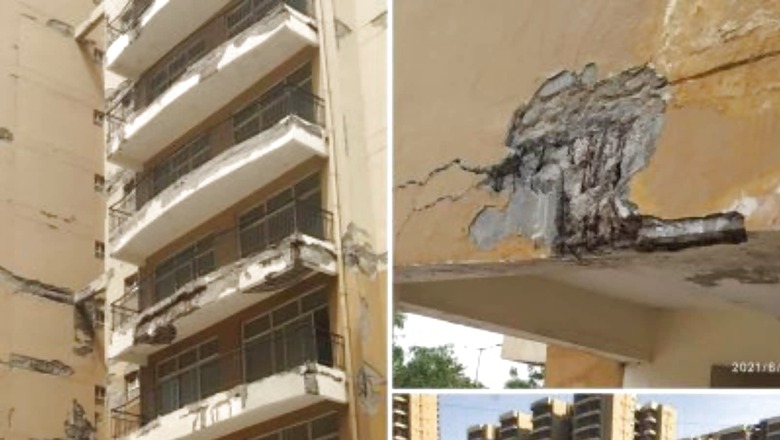
views
Champions of the public sector, who are a legion, keep lecturing us about the ‘stellar’ role state-run companies have played in nation building. The natural corollary is: the sale of public sector undertakings (PSUs) is akin to ‘selling family silver to pay the grocer’s bill’. However, one has to be gullible to believe that there is anything silvery about National Buildings Construction Corporation (India) Limited, a listed Government of India Navratna enterprise. At least, the dilapidated condition of the NBCC Green View group housing project in Gurugram’s Sector 37D suggests that.
This is the reason that the Gurugram administration recently directed NBCC Green View residents to vacate the building by March 1. It is easy for the authorities to issue such an order but following it is extremely difficult, and expensive, for the property owners.
Many of them have taken loans whose instalments they are still paying. Of more than 900 flats in the 18-acre housing project, about 260 have been sold. Over 100 families reside in the society at present.
Within a few months of moving in, the residents reportedly started noticing large cracks appearing on the walls and floors. The moulding tiles in the living rooms had come off for many. The walls of the flats have started exposing the iron rod beneath them and the plasters peeled off.
Safety became a big issue after several ceilings collapsed in another Gurugram society, Chintels Paradiso, claiming two lives. “We have been living in shoddily constructed flats for years now. These constructions are beyond repair now. NBCC did not pay heed to any of our complaints earlier. Now they are afraid after the Chintels Paradiso incident that they might have to take responsibility if anything happens to us. But they are completely inhumane people. They don’t care about our lives. Instead of our demand for a refund, they are serving us notices to vacate our houses,” said a G. Mohanty, president, association of apartment owners and former CBI spokesperson.
And all along, we thought that it is only the profit-chasing private businesspersons who are callous and inhumane.
The basic problem with PSUs is that they are controlled by politicians and bureaucrats, the people least equipped to run commercial enterprises. Not infrequently, political and partisan interests trump economic logic. Then there are the issues of incompetence and corruption. Governments, under all major political parties and alliances, have tried various methods over the decades — the MoU system, Ratna classification, Indradhanush for banks, revival packages, et al — but to no avail. For the public sector is inherently flawed and thus irredeemable.
This shows in the financial numbers. Consider this: in five years, from 2016-17 to 2020-21, the government infused Rs 3.1 lakh crore into public sector banks (PSBs). And how much does it get from PSBs? Consider the figure for the current fiscal. The government will get Rs 101,353 crore as dividends from the Reserve Bank of India and PSBs and financial institutions. Of this amount, the RBI alone contributes Rs 99,122 crore. In other words, PSBs and financial institutions like LIC contribute just Rs 2,231 crore.
Worse, in 2022-23, the government expects 27 per cent less than the 2021-22 figure from the RBI and PSBs and financial institutions — Rs 73,948 crore. And the estimated bank recapitalisation is Rs 15,000 crore.
Much of the so-called family silver is just junk. Actually worse than that, for junk merely occupies space, whereas public sector entities survive on taxpayer money.
Since PSUs and PSBs are irredeemable, the only way out is privatisation. For privatisation is the rollback of the state: the state recedes so that the entrepreneurial spirits of society could properly do what politicians and bureaucrats are unable to do efficiently. Also, privatisation is the most visible and poignant feature of the transition from socialism to capitalism, which is the only rational and humane system mankind has ever experienced.
A 2003 government document lists several benefits of privatisation. Releasing large amounts of public resources locked up in state-run enterprises for redeployment in areas that are much higher on the social priority, such as basic health, family welfare, primary education and social and essential infrastructure.
This would also stem “the further outflow of scarce public resources for sustaining the unviable” PSUs and PSBs, reduce “the public debt that is threatening to assume unmanageable proportions”, transfer “the commercial risk, to which the taxpayers’ money locked up in the public sector is exposed, to the private sector wherever the private sector is willing and able to step in.”
This also saves the country from, what Leftists call, ‘privatised losses and socialised losses’. In fact, privatisation doubly benefits the taxpayer: if a private company makes money, the exchequer gets money; if it incurs losses, the taxpayer doesn’t have to pay for the revival packages.
Therefore, the sooner the Narendra Modi government sells PSUs and PSBs — both profit- and loss-making — the better it would be for the taxpayer.
The author is a freelance journalist. The views expressed in this article are those of the author and do not represent the stand of this publication.
Read all the Latest Opinion News and Breaking News here




















Comments
0 comment